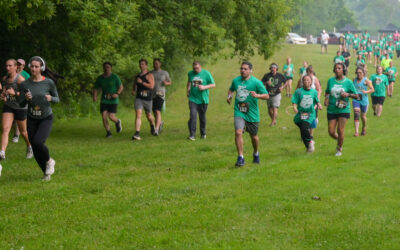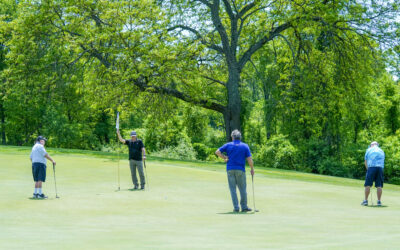85-year-old Author, Businessman and Philanthropist Visits WMU
“I looked over at the jersey next to me, and I saw the wings of an eagle! I can win, I can win, wings of an eagle! Boom! I felt the tape right across my chest. I came to the stop, and the official said, ‘Who are you?’”
He was Billy Mills, Oglala Lakota, an orphan raised on the Pine Ridge Reservation in South Dakota.
At that moment, he became the Gold Medalist in the 10,000-meter run at the 1964 Summer Tokyo Olympics.
Experts did not project Mills to win the race, and the sports announcers covering the Olympics barely mentioned his name. The Americans in the stands didn’t cheer Mills on until the last two laps of the race when he began to edge out the other competitors.
The NBC announcer didn’t comment on Mills’ taking over the lead. Instead, he was famously interrupted by track analyst Dick Banks, who yelled, “Look at Mills! Look at Mills!” Banks was fired the next day for his “unprofessionalism on the air.”
Nearly 60 years later, Mills remains the only man from the Western Hemisphere to have won that race.
During an event at Western Michigan University on Nov. 15, sponsored by the Native American Heritage Fund, Mills shared his inspirational life story. During a small event with Native American youth, then to a larger audience consisting of athletes, college students and people from all walks of life. Mills also spoke about the importance of passion and following your dreams.
“What are your dreams?” he asked the Tribal youth.
“I see your dreams, you have got powerful dreams, but they are locked up inside!” said Mills. “Nothing has the same power as the dreams I see in our young Native American men and women. We need you. We need your dreams, so powerful!”
Running his way to a gold medal was not a random act; it was part of Mills’ dream, imparted on him by his father’s last words to him before he died when Mills was 12, “Create the magic.”
After Mills’ mother had died when he was 8, his father told him, “Son, you have broken wings, but it takes a dream to heal broken wings. Find a passion in life.”
It was at the Haskell Indian Boarding School in Kansas, which he called home for several years, where Mills started running long distance. “I found out I was a quarter, half mile ahead of people at five miles.”
Mills went on to run competitively in college, receiving athletic scholarships to the University of Kansas, but it wasn’t happily ever after.
“One day, I broke. I was asked to step out of a team picture, because I was too dark-skinned. But I didn’t step out; I stayed in the photo. But when I got back to the hotel, I stood on a chair in my fourth-floor room, ready to jump. I didn’t want to kill myself. I just wanted to go where it was quiet.”
“I heard a voice, sounding like my father’s, say, ‘Don’t!’ I got off the chair, and I wrote down the words, ‘Gold Medal, Olympic 10,000-meter run.’”
Mills followed that dream, and the rest is history.
“You’re an American hero,” said Native News Online Editor Levi Rickert, Citizen Band Potawatomi, who interviewed Mills during the event at WMU. “How did you remain relevant for all these decades?”
“I did not become an Olympic gold medalist. I became a person who took from the games global unity, the dignity, character, of global diversity,” said Mills. “I took the Lakota prayer, ‘we’re all related,’ and tied that all into global diversity.
“I was ranked number one in the world, have a world record and an Olympic Gold Medal – the three highest honors in my field. My entire track record was 11 months, but I had trained 15 years for it.
“People expected me to excel that way in other areas of my life.”
Excelling is in Mills’ nature; he exceeded expectations over the next several decades.
His foundation, Running Strong for American Indian Youth®, features the Dreamstarters program, which awards $10,000 to 10 Native youths and the nonprofit organization of their choice. Each young person uses the money for a project based on their dreams for their Community.
From this springboard, many youths have formed their foundations and created businesses and careers in health, where Native representation is greatly needed.
“You have raised more than $40 million for Native American youth,” Rickert said to Mills.
The duo also mentioned the several books Mills has written. Wokini, focuses on spirituality through the lens of the Lakota traditions. Mills co-authored this book with his longtime friend, best-selling author Nicholas Sparks (The Notebook, Message in a Bottle).
“Reading is the most powerful thing I have done!” said Mills to the youth, whom he encouraged to read, grow and change the world throughout his conversations.
The youth portion of the event was introduced by WMU-NASO (Native American Student Organization) President Skyler Wolverton, with the entire evening planned by WMU faculty adviser to WMU-NASO Dee Sherwood, Ph. D.
Special thanks to Southern Strait, who performed several Songs for the occasion, and Paul Syrette, who Smudged the audience before the main speaking presentation by Mills.
WMU held a special reception with members of the Native Community, where attendees could meet Mills one-on-one.
For more information on the Dreamstarters program and Running Strong for American Indian Youth, please visit indianyouth.org.




0 Comments